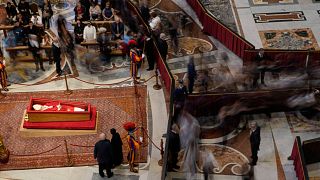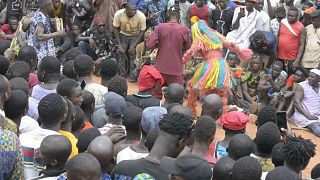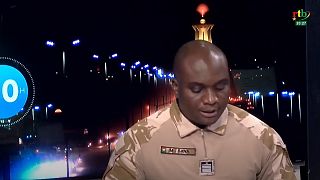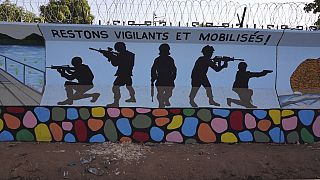Burkina Faso
The hit comedy series "Welcome to Kikidéni" is set to return to TV screens after more than a decade, offering the Burkinabe society a safety valve of laughter— making light of some of the country's many problems.
The show follows the rivalries between a village leader, an imam, and a priest, using their squabbles to provide a gently satirical take on insecurity, religious fundamentalism, pandemics, tolerance, feminism, and other sensitive issues. All "addressed in a comic tone, with a lot of humour," says actor and director, Aminata Diallo-Glez.
Your country is one of the poorest in the world, battered by a bloody jihadist insurgency and last year underwent two military coups.
So, if you are a citizen of Burkina Faso, what can you do?
Well, instead of plunging into despair, you can turn to the safety valve of laughter -- making light of some of the country's many problems.
Just in time, one of the Sahel nation's best-loved comedy series is set to return to the TV screens with the aim of providing precisely that kind of therapy.
"Bienvenue a Kikideni" ("Welcome to Kikideni") follows the rivalries between a village leader, an imam and a priest, using their squabbles to provide a gently satirical take on insecurity, religious fundamentalism, pandemics, tolerance, feminism and other sensitive issues.
"It lays bare the facts of society," said actor and director Aminata Diallo-Glez.
But "these themes are always addressed in a comic tone, with a lot of humour in there."
"Kikideni" began life in 2005 under the title of "Three Men, One Village," and came back for a second series five years later.
It returns for a third series of 20 26-minute episodes -- and true to type, making the show has been affected by the security crisis.
Diallo-Glez admitted she was "very moved to be completing the project."
"Before, we used to shoot in Ziniare 35 kilometres (22 miles) north of the capital Ouagadougou, and sleep there. But we can't do that anymore," she said.
"We then looked for a village, Wanvouss, fairly close to Ouagadougou, which met the requirements for a set in a somewhat rural environment."
The three characters at the heart of the plot bicker over their differences but always find a way of co-existing, said Ildevert Meda, who plays the role of Kikideni's priest.
"It's daily life with big human rivalries," said Meda. "But at the same time we show that being different is not a hindrance but an advantage."
"We show that contradiction is possible and that you can live in peace and social cohesion," he added. "People identify with it because it's so human."
- Security crisis -
Some of the humour touches delicately on the country's deep security problems.
Since jihadists swept in from neighbouring Mali in 2015, more than 10,000 people have died, according to an NGO count, while at least two million have been displaced. More than a third of the country lies outside the government's control.
In one episode, the village debates whether it should mount a collective defence against the insurgents.
The imam, pumped up, declares rather ludicrously, "my fists alone are enough to deter any enemy" -- a discreet reference to the junta's announcement in April of "general mobilisation" against the violence.
The imam is played by Rasmane Ouedraogo, a 70-year-old actor who in real life is a member of a civilian militia, the Volunteers for Defence of the Fatherland (VDP), which supports security operations against the jihadists.
Filming for the third series is set to finish at the end of July. The show will be broadcast on Canal+ and Burkina Faso public television in early 2024, according to the production company.
Ouedraogo said the show was popular in other African countries but its theme -- of people rubbing along despite their differences -- would resonate further afield.
"All the problems raised here are ultimately universal problems," Ouedraogo said.
"Whether it's in Europe, the Americas or Africa, it's the big question of today: how do we live together?"











02:19
In Ghana, an illegal settlement turned a forest reserve into a criminal city
Go to video
Protesters in Haiti demand protection against gangs
Go to video
Africa’s trade winds shift amid tariffs, reforms, and regional tensions {Business Africa}
Go to video
A booming market, but lacking data: Africa's challenge [Business Africa]
01:01
Kenyan police officer killed in suspected gang attack in Haiti
Go to video
Progress in solar power expansion in Mali amidst significant challenges